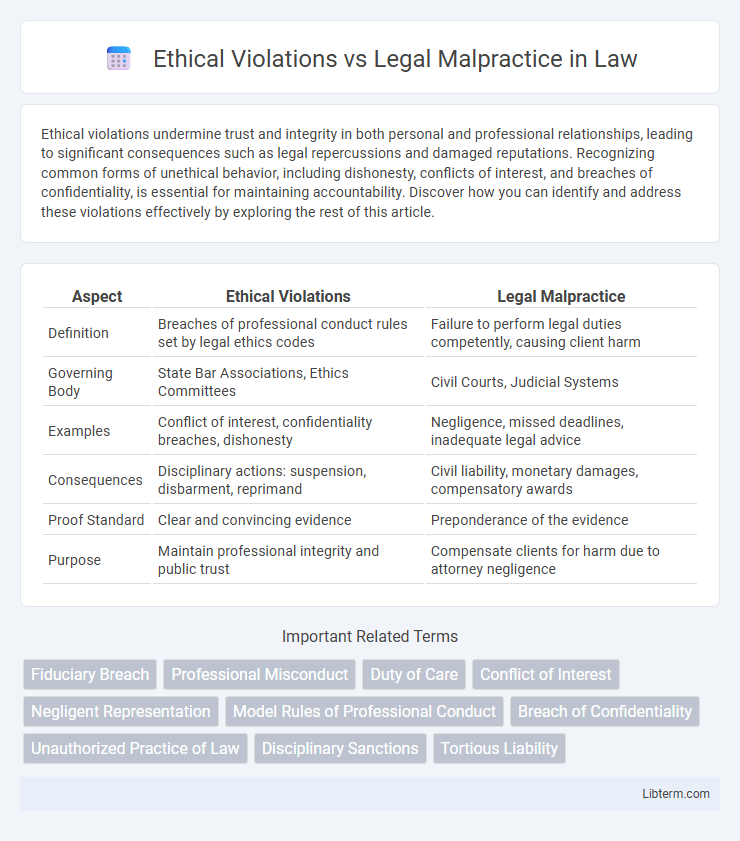Ethical violations undermine trust and integrity in both personal and professional relationships, leading to significant consequences such as legal repercussions and damaged reputations. Recognizing common forms of unethical behavior, including dishonesty, conflicts of interest, and breaches of confidentiality, is essential for maintaining accountability. Discover how you can identify and address these violations effectively by exploring the rest of this article.
Table of Comparison
| Aspect | Ethical Violations | Legal Malpractice |
|---|---|---|
| Definition | Breaches of professional conduct rules set by legal ethics codes | Failure to perform legal duties competently, causing client harm |
| Governing Body | State Bar Associations, Ethics Committees | Civil Courts, Judicial Systems |
| Examples | Conflict of interest, confidentiality breaches, dishonesty | Negligence, missed deadlines, inadequate legal advice |
| Consequences | Disciplinary actions: suspension, disbarment, reprimand | Civil liability, monetary damages, compensatory awards |
| Proof Standard | Clear and convincing evidence | Preponderance of the evidence |
| Purpose | Maintain professional integrity and public trust | Compensate clients for harm due to attorney negligence |
Understanding Ethical Violations in Legal Practice
Ethical violations in legal practice involve breaches of professional conduct codes established by legal governing bodies, encompassing actions like conflicts of interest, confidentiality breaches, and misrepresentation. These violations undermine the integrity of the legal system and can lead to disciplinary sanctions, including disbarment or suspension, separate from legal malpractice claims. Understanding ethical violations requires familiarity with rules set by organizations such as the American Bar Association (ABA) Model Rules of Professional Conduct and how they differ from negligence or incompetence claims underlying malpractice.
Defining Legal Malpractice: Key Elements
Legal malpractice occurs when an attorney fails to provide competent representation, breaching their duty of care to the client and causing measurable harm. Key elements include establishing an attorney-client relationship, demonstrating negligence or breach of fiduciary duty, proving causation linking the attorney's actions to damages, and quantifying the resulting financial loss. Understanding these components distinguishes legal malpractice from broader ethical violations, which may not always result in direct client harm.
Differences Between Ethics and Law in the Legal Profession
Ethical violations in the legal profession refer to breaches of the professional code of conduct established by legal ethics organizations, such as the American Bar Association's Model Rules of Professional Conduct. Legal malpractice involves negligence or breach of duty by an attorney that directly causes harm to a client, constituting a legal cause of action for damages under tort law. While ethical violations address adherence to moral and professional standards, legal malpractice centers on the attorney's failure to competently represent a client, highlighting the distinction between professional ethics and legal liability.
Common Examples of Ethical Violations
Common examples of ethical violations in legal practice include conflicts of interest, where lawyers represent clients with opposing interests without proper disclosure, and breaches of client confidentiality, such as sharing sensitive information without consent. Lawyers often face ethical issues like misappropriation of client funds or failure to communicate adequately with clients, which undermine trust and professional integrity. These violations differ from legal malpractice, which typically involves negligence or errors in legal services causing client harm rather than breaches of ethical standards.
Typical Scenarios of Legal Malpractice
Typical scenarios of legal malpractice include missed deadlines for filing lawsuits, inadequate investigation of facts, and failure to communicate critical information with clients. Ethical violations often overlap but specifically involve breaches of confidentiality, conflicts of interest, and misappropriation of client funds. Understanding these distinctions helps identify when poor professional conduct crosses from ethical issues into actionable legal malpractice claims.
Professional Consequences of Ethical Breaches
Ethical violations in the legal profession can lead to disciplinary actions such as suspension or disbarment by state bar associations, severely impacting an attorney's career. Legal malpractice, often involving negligence or breach of duty, results in civil lawsuits and financial liability that can damage professional reputation and client trust. Both ethical breaches and malpractice undermine the integrity of legal practice, prompting regulatory bodies to enforce strict penalties to maintain professional standards.
Legal Repercussions of Malpractice Claims
Legal malpractice claims often result in significant legal repercussions, including compensatory damages and punitive penalties against the attorney involved. Courts may impose disciplinary actions such as suspension or disbarment to uphold professional standards and protect clients' rights. These consequences differ from ethical violations, which primarily trigger professional conduct reviews without necessarily involving civil litigation or financial restitution.
Prevention Strategies for Ethical and Legal Misconduct
Effective prevention strategies for ethical violations and legal malpractice include comprehensive training on professional standards, regular audits of legal practices, and establishing confidential reporting systems. Implementing strict compliance programs ensures adherence to both ethical codes and legal requirements, reducing risks of misconduct. Continuous monitoring and mentorship foster a culture of accountability and integrity within law firms and legal departments.
Reporting Procedures for Ethical and Malpractice Issues
Reporting procedures for ethical violations and legal malpractice differ significantly in scope and authority. Ethical violations are typically reported through state bar associations or ethics committees, which investigate breaches of professional conduct based on established codes like the ABA Model Rules. Legal malpractice claims proceed through civil litigation, requiring the plaintiff to prove duty, breach, causation, and damages, with courts overseeing the resolution of malpractice disputes.
Importance of Upholding Ethics and Law in Legal Practice
Upholding ethics and law in legal practice safeguards client trust and maintains the integrity of the judicial system. Ethical violations, such as conflicts of interest and confidentiality breaches, undermine professional standards, while legal malpractice involves negligence and failure to competently represent clients, leading to significant legal consequences. Ensuring strict adherence to both ethical codes and legal requirements is essential for sustaining public confidence and preventing malpractice claims.
Ethical Violations Infographic

 libterm.com
libterm.com